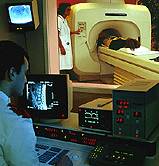 |
 |
 |

Modified MRI Spots Early Osteoarthritis
Known biomarker easier to identify, so permanent joint damage may be avoided, study says|
|
HealthDay
By Robert Preidt
Wednesday, August 20, 2008
 WEDNESDAY, Aug. 20 (HealthDay News) -- A modified form of MRI may help diagnosis osteoarthritis at an early stage when it may be possible to prevent or reduce permanent joint damage, say U.S. researchers.
WEDNESDAY, Aug. 20 (HealthDay News) -- A modified form of MRI may help diagnosis osteoarthritis at an early stage when it may be possible to prevent or reduce permanent joint damage, say U.S. researchers.
Current diagnostic methods don't detect osteoarthritis until it's in advanced stages. In this new approach, MRI is used to determine the concentration of a polymer called glycosaminogycan (GAG), a recognized biomarker for both osteoarthritis and degenerative disc disease. It's known that a low concentration of GAG is associated with the onset of osteoarthritis and other cartilage disorders.
The research was expected to be presented Aug. 20 at the national meeting of the American Chemical Society, in Philadelphia.
"Our methods have the potential of providing early warning signs for cartilage disorders like osteoarthritis, thus potentially avoiding surgery and physical therapy later on. Also, the effectiveness of early preventative drug therapies can be better assessed with these methods," researcher Alexej Jerschow said in an ACS news release.
Osteoarthritis, the most common form of arthritis, causes joint pain and disability for almost 21 million people in the United States. Osteoarthritis is especially common in the knee and hip and is the most common reason for total hip and total knee replacement surgery.
The cost and time it takes for the MRI assessment of cartilage is about the same as a normal MRI, and diagnosis could be given on the same day as the test, the researchers said.
HealthDay
Copyright (c) 2008 ScoutNews, LLC. All rights reserved.
Related News:
More News on this Date
Related MedlinePlus Pages:
| Home | Health Topics | Drugs & Supplements | Encyclopedia | Dictionary | News | Directories | Other Resources | |
| Disclaimers | Copyright | Privacy | Accessibility | Quality Guidelines U.S. National Library of Medicine, 8600 Rockville Pike, Bethesda, MD 20894 National Institutes of Health | Department of Health & Human Services |
Date last updated: 21 August 2008 |




